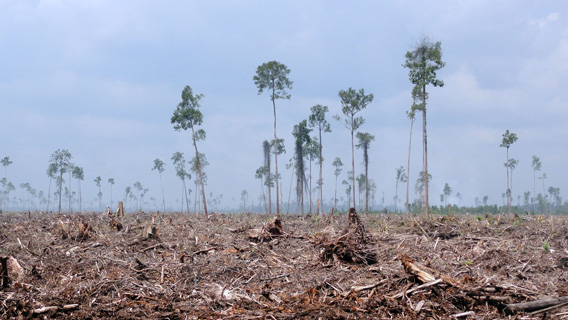
Peat draining and large-scale clearance of natural forest by APP wood supplier PT. Ruas Utama Jaya. Eyes of the Forest said the clearing occurred inside APP’s Senepis Tiger Sanctuary, but the paper giant says the clearing is in an area that was allocated for conversion — and signed off by the Indonesian government — in 2008. APP claims the Senepis Tiger Sanctuary — more than 85 percent of which belongs to another company — remains intact. © Eyes of the Forest / WWF-Indonesia
Asia Pulp & Paper (APP), a forestry giant that has been heavily criticized for destroying rainforests and peatlands in Indonesia, will temporarily suspend clearing of natural forest areas until conservation assessments have been conducted.
In a statement issued Tuesday, APP said the moratorium on forest clearing will take effect June 1 for concessions owned outright by its subsidiaries. APP said its “independently owned” pulpwood suppliers will be expected to come into compliance by December 31, 2014. APP had earlier pledged to cease conversion of natural forests by 2015, after missing previous commitments in 2004, 2007 and 2009.
APP called the move “the ‘next natural evolution’ of its sustainability strategy” and said it aims to adopt “internationally-recognized standards” for assessing High Conservation Value Forest (HCVF) areas. It added that the HCVF assessments “will be based on a multi-stakeholder approach” and adhere to “HCV Resource Network best practice”.
Once the surveys are complete, APP “will protect all identified HCVF areas as a result of the HCVF assessments.”
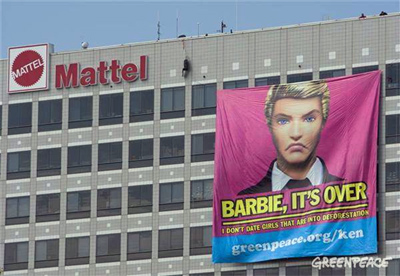 Greenpeace’s anti-APP stunt at Mattel’s headquarters on June 8, 2011. In addition to hundreds of thousands of hectares of eucalyptus and acacia plantations, APP and its suppliers hold concessions to vast areas of forest across Jambi and Riau Provinces on the island of Sumatra. Typically these forest areas would be cleared, with trees used to feed its giant pulp and paper mills, and then planted with fast-growing non-native tree species. |
APP will “engage” with its independent suppliers to adopt the HCVF assessment protocol and “review and reevaluate supply agreements where HCVF assessments are not conducted.”
APP’s announcement appears to be part of a push to stem a recent exodus of major customers. Complaints lodged by green groups and scientists about its forestry practices have cost the paper giant hundreds of millions of dollars in contracts. APP has also been accused by authorities in Sumatra of illegal land clearing and criticized by human rights NGOs for social conflict in some of its concession areas.
But APP’s new policy wasn’t enough to win over its fiercest critic, Greenpeace, which is in the midst of a campaign to reform the forestry’s giant’s practices and has found evidence of illegal clearing.
“The small print of this latest APP commitment indicates that only a minority of its supply chain is to be included in today’s announcement,” Bustar Maitar, Head of Forest Campaign for Greenpeace-Indonesia, told mongabay.com, adding that APP failed to conserve areas previous audits classified as HCVF. “If APP were serious about its commitment to clean their supply chain of natural forest and peatland destruction, it would be easy to require compliance from all its suppliers immediately.”
“This announcement is a wasted opportunity. If APP were serious about reform it would address the issues of clearance of natural forests and peatland, as its sister company Golden Agri Resources, has done. By sidestepping these issues APP has just ensured it will continue to lose customers and tarnish the reputation of Indonesia’s forest sector around the world.”
Golden Agri Resources (GAR), the Singapore-based palm oil company that owns PT SMART, one of Indonesia’s largest palm oil producers, last year signed a comprehensive forest policy that prohibits conversion of land with more than 35 tons of carbon and requires free, prior informed consent (FPIC) in dealing with local communities. GAR, which said the agreement would have an “immaterial” impact on its bottom line, has since seen a big boost in its reputation internationally. The palm oil company had also been targeted by Greenpeace until it established the forest policy.
APP however hasn’t take the same tact according to Greenpeace, WWF, and other green groups, which charge it with engaging in an aggressive marketing campaign rather than enacting meaningful reform. A WWF report released late last year chastised APP for allegedly failing to uphold previous conservation commitments.
Related articles
Ongoing deforestation puts APP in breach of debt restructuring agreements, finds report
(03/27/2012) Asia Pulp & Paper (APP) has broken “legally binding” debt restructuring agreements by continuing to clear native forests in Sumatra, alleges a new report from Eyes on the Forest, a coalition of Indonesian environmental groups.
After illegal logging allegations, certifier lodges complaint against paper giant APP
(03/07/2012) Less than a week after Greenpeace released evidence that protected tree species were being illegally logged and pulped at an Asia Pulp and Paper (APP) mill in Sumatra, a major certifier, the Program for the Endorsement of Forest Certification (PEFC), has lodged a complaint and asked for an investigation. In addition to PEFC’s move, the National Geographic Society (NGS), which was found to be sourcing from APP recently, has publicly broken ties with the company, and Greenpeace has handed over its evidence to Indonesian police who told the group there would be an investigation.
Investigation links APP to illegal logging of protected trees

(03/01/2012) A year-long undercover investigation has found evidence of Asia Pulp and Paper (APP) companies cutting and pulping legally protected ramin trees, a practice that violates both Indonesian and international law. Found largely in Sumatra’s peatswamp forests, the logging of ramin trees (in the genus Gonystylus) has been banned in Indonesia since 2001; the trees are also listed under Appendix II of the Convention on International Trade in Endangered Species (CITES) and thus require special permits to export. The new allegations come after APP, an umbrella paper brand, has lost several customers due to its continued reliance on pulp from rainforest and peatland forests in Sumatra.
Paper giant hammered on forest certification claims
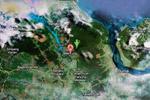
(02/15/2012) Beleaguered paper giant Asia Pulp & Paper was sharply criticized Wednesday for its claims that its operations are certified sustainable by independent auditors. WWF said its survey of certifiers and certification schemes shows that none apply to ‘the most controversial operations’ of APP’s suppliers: clearing of rainforests and peatlands that are home to endangered tigers, elephants, and orangutans. In responding to complaints from environmentalists that its operations are responsible for large-scale destruction of native forests, APP often touts various certification standards which it says demonstrate its commitment to sustainability. Yet the new WWF survey found that these standards don’t apply across all of the paper giant’s operations — APP’s suppliers in Indonesia continue to harvest and convert natural forests. Nor do the certification standards necessarily prove that APP’s forest management practices are ‘sustainable’.

Some toilet paper production destroys Indonesian rainforests, endangering tigers and elephants
(02/09/2012) American consumers are unwittingly contributing to the destruction of endangered rainforests in Sumatra by purchasing certain brands of toilet paper, asserts a new report published by the environmental group WWF. The report, Don’t Flush Tiger Forests: Toilet Paper, U.S. Supermarkets, and the Destruction of Indonesia’s Last Tiger Habitats, takes aim at two tissue brands that source fiber from Asia Pulp & Paper (APP), a paper products giant long criticized by environmentalists and scientists for its forestry practices on the Indonesian island of Sumatra. The brands — Paseo and Livi — are among the fastest growing, in terms of sales, in the United States.
WWF: Asia Pulp & Paper misleads public about its role in destroying Indonesia’s rainforests
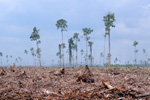
(12/16/2011) Asia Pulp & Paper (APP) continues to mislead the public about its role in destroying rainforests and critical tiger habitat across the Indonesian island of Sumatra, alleges a new report from Eyes on the Forest, a coalition of Indonesian environmental groups including WWF-Indonesia. The report, titled The truth behind APP’s Greenwash, is based on analysis of satellite imagery as well as public and private documentation of forest cleared by logging companies that supply APP, which is owned by the Indonesian conglomerate, Sinar Mas Group (SMG). The report concludes APP’s fiber suppliers have destroyed 2 million hectares of forest in Sumatra since 1984.
Paper commitments for the Indonesian industry

(12/13/2011) The Indonesian group Asia Pulp & Paper (APP) has been the target of many NGOs for years due to its alleged negative impacts on tropical forests. This culminated in a spectacular campaign launched by Greenpeace in 2011 based on Ken “dumping” Barbie. The rationale was that toy brand Mattel was accused of using APP paper products linked to the clear-cutting of natural forests in the Indonesian archipelago. APP organized a counter-attack in the media with the daily publication of advertisements promoting its sustainable development practices. Journalists from all over the world were also invited to attend guided tours of APP concessions to demonstrate their conservation efforts, and a number of articles were subsequently written.
War of words between Greenpeace, Asia Pulp & Paper over deforestation allegations

(11/16/2011) Greenpeace and Asia Pulp & Paper (APP), a giant global paper supplier, are locked in a heated battle over the activist group’s allegations that APP products contain fiber sourced from the destruction of forests in Indonesia. At stake is APP’s access to some of the world’s most lucrative markets. Until APP provides solid evidence refuting Greenpeace’s accusation that its pulp and paper production isn’t coming at the expense of natural forests in Indonesia, APP will have a difficult time winning over critics.

(07/27/2011) Indonesia’s forests were cleared at a rate of 1.5 million hectares per year between 2000 and 2009, reports a new satellite-based assessment by Forest Watch Indonesia (FWI), an NGO. Expansion of oil palm and wood-pulp plantations were the biggest drivers of deforestation, yet account for a declining share of the national economy. The study, which compared year 2000 data with 2009 Landsat images from NASA, found that Indonesia’s forest cover declined from 103.32 million hectares to 88.17 million hectares in ten years. Since 1950 Indonesia lost more than 46 percent of its forests.
Barbie, Legos, other toys linked to destruction of Indonesia’s rainforests

(06/07/2011) Some of the world’s largest and most prominent toy-makers are sourcing their packaging materials from companies linked to large-scale destruction of Indonesia’s rainforests, alleges a new report from Greenpeace. The report, How APP is Toying with Extinction, is based on forensic analysis of toy packaging from Mattel, which manufacturers Barbie and Hot Wheels toys; Disney, which makes a variety of toys linked to its movies; Hasbro, which produces GI Joe, Star Wars, and Sesame Street toys and various games like Monopoly and Scrabble; and Lego, which makes the iconic plastic building blocks. The analysis found traces of mixed-tropical hardwood (MTH) and acacia fiber which are principally sourced from Asia Pulp & Paper (APP), an umbrella paper products brand that sources from several companies that have been linked to rainforest destruction in Sumatra.
Pulp and paper firms urged to save 1.2M ha of forest slated for clearing in Indonesia
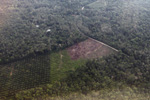
(03/17/2011) Indonesian environmental groups launched a urgent plea urging the country’s two largest pulp and paper companies not to clear 800,000 hectares of forest and peatland in their concessions in Sumatra. Eyes on the Forest, a coalition of Indonesian NGOs, released maps showing that Asia Pulp and Paper (APP) and Asia Pacific Resources International Limited (APRIL) control blocks of land representing 31 percent of the remaining forest in the province of Riau, one of Sumatra’s most forested provinces. Much of the forest lies on deep peat, which releases large of amount of carbon when drained and cleared for timber plantations.
Does chopping down rainforests for pulp and paper help alleviate poverty in Indonesia?

(01/13/2011) Over the past several years, Asia Pulp & Paper has engaged in a marketing campaign to represent its operations in Sumatra as socially and environmentally sustainable. APP and its agents maintain that industrial pulp and paper production — as practiced in Sumatra — does not result in deforestation, is carbon neutral, helps protect wildlife, and alleviates poverty. While a series of analyses and reports have shown most of these assertions to be false, the final claim has largely not been contested. But is conversion of lowland rainforests for pulp and paper really in Indonesia’s best economic interest?
Pulp plantations destroying Sumatra’s rainforests

(11/30/2010) Indonesia’s push to become the world’s largest supplier of palm oil and a major pulp and paper exporter has taken a heavy toll on the rainforests and peatlands of Sumatra, reveals a new assessment of the island’s forest cover by WWF. The assessment, based on analysis of satellite imagery, shows Sumatra has lost nearly half of its natural forest cover since 1985. The island’s forests were cleared and converted at a rate of 542,000 hectares, or 2.1 percent, per year. More than 80 percent of forest loss occurred in lowland areas, where the most biodiverse and carbon-dense ecosystems are found.














